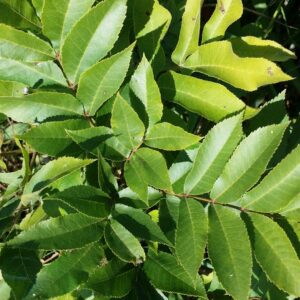Showing the single result
Wholesale Pecan Trees in Michigan
Cold Stream Farm is the proud purveyor of wholesale pecan trees in Michigan. We grow and ship Northern pecan plants from our facilities in Free Soil, with shipment available throughout the United States. There are currently restrictions on delivery to Arizona, Texas, and California, so please contact us if you have any questions about purchasing wholesale pecan trees with Cold Stream Farm.
About our Wholesale Pecan Trees
Available in a few different sizes with no minimum order, Cold Stream Farm supplies Northern Pecan (Carya illinoinensis) trees grown as bare root seedlings. Carya illinoinensis shrubs are the most common kind of Pecan trees, accounting for roughly half of the world’s population. The trees are often simply known as pecan or northern pecan.
Native to the Mississippi River Area
Northern Pecan (Carya illinoinensis) trees are native to the Mississippi River Area, growing naturally in American states such as Louisiana, Mississippi, Texas, Oklahoma, Missouri, Arkansas, and Illinois. There are also wild and naturalized pecan trees found throughout northern Mexico.
Cultivated as a Cash Crop
Often enjoyed in a pie around Thanksgiving, pecan plants are now being cultivated as a cash crop in North America. The edible nuts have a sweet flavor that can be used in oil and cooking. Although cultivation began in the 1880s, pecan trees are still one of the most relatively new major domesticated crops in the United States.
Pecan Tree Size and Appearance
Mature pecan trees grow to reach upwards of 40 feet in height, with a large group of upward branches spreading to as much as 3 feet in width. The tree can be recognized by its seed husks, which start as small green growths before maturing into dark brown bits. Splitting open into 4 sections, the edible pecan nut then emerges in late fall.
How do you pronounce Pecan?
The word “pecan” derives from an Algonquin word that was used to describe a few different edible fruits including pecans, hickory nuts, and walnuts. The nut has been pronounced in a few different ways regionally, with the “a” used as both a short and long vowel sound. Although neither is technically correct, the nut may be pronounced “pe-CAN” and “pe-Kahn” by various cultures.
Ideal Growing Conditions for Pecan Trees
As a native to the American South and northern Mexico, pecan trees prefer warm and humid climates to grow and thrive. If exposed to prolonged cool temperatures, pecan trees run the risk of stunted growth without any nut production.
In the United States, pecan trees are best suited for Hardiness zones 5 through 9. The trees grow well in full sun conditions with moist, well-drained soils. Pecan trees generally respond well to mulches full of organic matter and are often used to provide shade to a new area.
Planting and Maintaining Your Pecan Trees
Once you’ve selected your tree’s location, dig a shallow wide hole for your pecan plant. The trees take up to 20 years to reach maturity but will provide decades of nut production. To keep deer and other unwanted pests from damaging your pecan trees, it is recommended to encase an immature trunk with protective materials.
After drenching your bare-root seedlings with a bucket of water, plant your pecan in the ground and water it immediately to eliminate air pockets. Without rain, it is necessary to water growing pecan trees every week until they reach maturity. For the best results, zinc and fertilizer application are recommended for both young and nut-bearing plants.
Common Issues with Pecan Harvesting
Unfortunately, pecans are prone to a number of diseases such as scab, shuck decline, and hickory shuck worm. Infestations from weevils, aphids, beetles, and more are common for pecans, with insect infestations feeding on the plants’ seeds, stems, and other parts. To keep a pecan tree in its best condition, fertilizers without urea are best for preventing mouse-ear.
Best Uses for Pecan Tree Products
Besides snacking directly off of the plant, pecan nuts are most commonly found in pies and flavoring for desserts and smoked meats. Pecans are used in both pralines as well as butter. Besides the nuts, the wood from pecan trees is also quite strong, used in both flooring and furniture.
Ecology & Wildlife Interaction
Humans are not the only species that enjoy pecans. In fact, the tree is a favorite among many bird and mammal species including raccoons, ducks, cows, raccoons, blue jays, foxes, and more.
Interesting Facts
Several states have declared the pecan as their official state nut including California, Texas, Arkansas, Alabama, and Oklahoma. In 1998, the “official meal” of Oklahoma was debuted, featuring a pecan pie for dessert.
Wholesale pecan trees from Cold Stream Farm.
Please check our current availability of wholesale pecan trees to begin your purchase. Our Michigan-based supply of pecan trees is limited, with order fulfillment to the contiguous United States with the exception of Texas, Arizona, and California. Cold Stream Farm can be contacted for questions about stock, shipping, and future availability for both wholesale and retail pecan tree orders.

